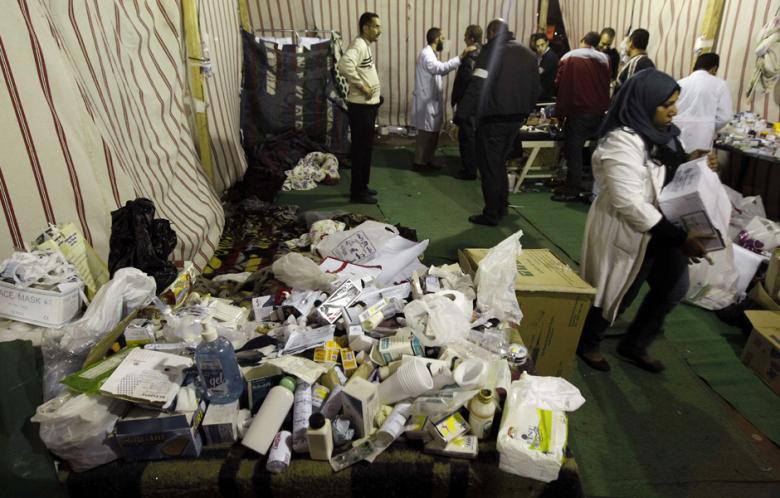
(AFP PHOTO / MAHMOUD KHALED)
The 30 June Fact Finding Committee found that 607 protesters were killed during the Rabaa Al-Adaweya sit-in dispersal on 14 August 2013.
The committee made its announcement in a report released Wednesday during a press conference at the Shura Council. The report includes verified data on casualties related to political events since former president Mohamed Morsi’s ouster in July 2013.
The report is divided into two parts, the first tackling the assemblies in public spaces, while the other tackled the events at Rabaa Al-Adaweya.
Head of the committee Fouad Riyad announced in the conference that the Rabaa Al-Adaweya assembly began peacefully, but later became infiltrated by weapons amid loose security measures. He also said the first casualty was amongst police ranks, which pushed them to take a reactionary stance and escalate the violence.
The 800-page report by the 17-member committee documented 607 deaths among protesters and 8 deaths and 156 injured among the policemen in Rabaa Al-Adaweya. Riyad condemned the police’s “brutal” reaction against the protesters, holding the government accountable for the number of casualties.
The report also investigated other incidents in the period July 2013 – July 2014, including the clashes at Republican Guard in June 2013, the torching of churches and assaults against Christians, university violence, assassination attempts, the situations in the Suez Canal and Sinai, and incidents of torture and terrorism.
During the press conference, the committee reviewed video excerpts and documents in the report for approximately 30 minutes.
The report documented 64 incidents of church attacks across Egypt, particularly in rural areas, condemning the role that the police played in preventing Christians from fleeing from some villages.
Following the dispersal of the sit-ins, large numbers of churches and residential areas populated by Christians, as well as businesses owned by Christians, came under attack nationwide. Scores of churches were burned amid widespread violence throughout the country.
The committee is a government initiated entity formed after the 30 June uprising to document the events surrounding it. Fouad said his committee worked independently and did not receive government interference. This is the second time the committee has received an extension.
Over the past months it has been working on verifying the new data and filtering it to compose the full report that documents the events that took place from June 2013 to June 2014. Committee spokesman Amr Marwan said the committee has received a “huge amount” of videos and documents from families and official entities.
Following Morsi’s ouster in July 2013, Muslim Brotherhood supporters started a sit-in at the Rabaa Al-Adaweya and Nahda squares. Both sit-ins were dispersed a month later, leaving a disputed number of deaths and injuries.
Human Rights Watch reported about 1,000 people dead, and referred to the dispersal as a “massacre”, while the Egyptian government reported a death toll of only 627, condemning the HRW report for including “misleading information”.
The committee also announced a list of recommendations at the end of the press conference, which included chiefly reviewing the Protest Law, amending the penal code to conform with the terms of International Treaty for Countering Torture, and providing compensation for all victims of political clashes who were not found guilty of inciting violence.
Finally, they urged the interior ministry to train its individuals on dealing peacefully with protestors. Referring to the huge number of detainees over the past year, they also called on the ministry to use detention in the narrowest sense and deal with it as a temporary procedure instead of a punishment.
Additional reporting by Hoda Badry


